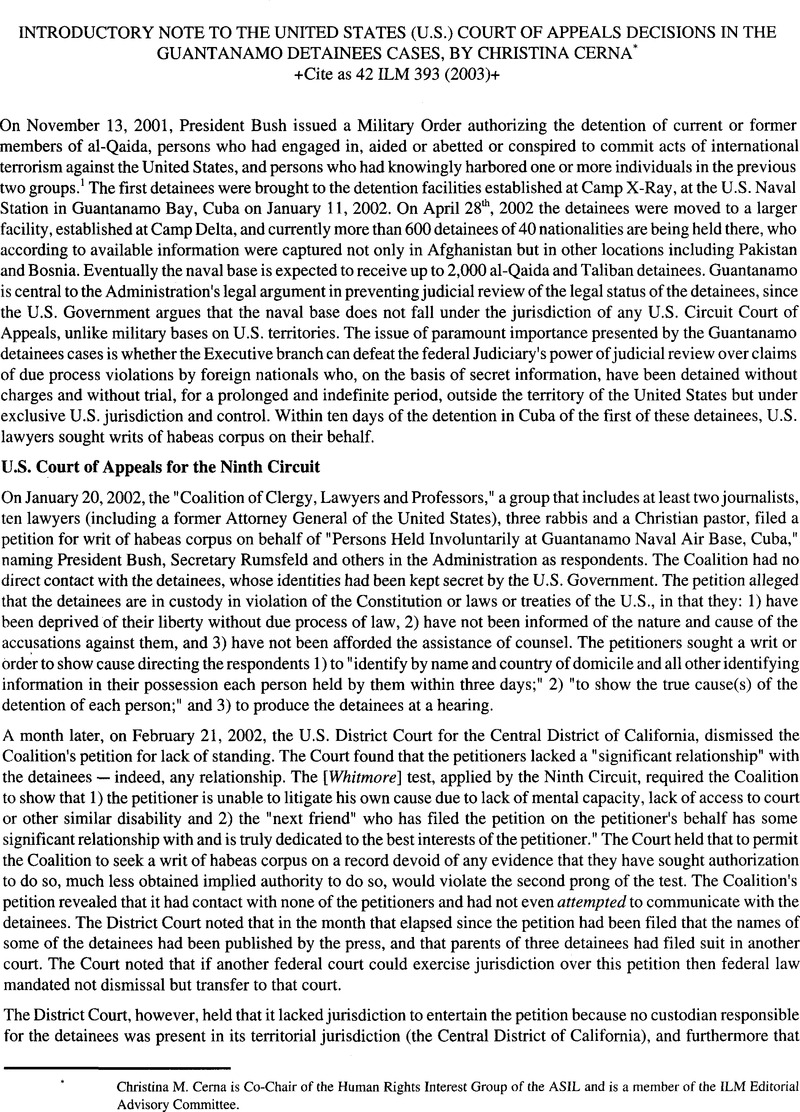No CrossRef data available.
Published online by Cambridge University Press: 27 February 2017

* Christina M. Cema is Co-Chair of the Human Rights Interest Group of the ASIL and is a member of the ILM Editorial Advisory Committee.
1 On September 11, 2001, 19 suicide bombers, purportedly belonging to the terrorist organization known as al-Qaida, hijacked civilian aircraft and attacked selected targets in the United States. They destroyed the twin towers of the World Trade Center in New York and a section of the Pentagon, and caused the crash of a civilian aircraft in Pennsylvania, resulting in the deaths of almost 3,000 persons, who were nationals of some 81 countries. On September 14,2001, the U.S. President declared a state of national emergency and sought international cooperation in its response to these attacks, and on September 18, 2001 a joint resolution of Congress authorized the use of military force against those responsible for the attacks. NATO invoked article 5 of the Washington Treaty, for the first time in its history, which provides that an armed attack on one or more of the Allies in Europe or North America shall be considered an attack on them all. On October 7, 2001, the United States notified the Security Council that it had “initiated actions in the exercise of its inherent right of individual and collective self-defense following the armed attacks that were carried out against the United States on September 11, 2001.” In that letter, which announced the launching of U.S. armed attacks against the al-Qaida terrorist training camps and military installations of the Taliban regime in Afghanistan, the U.S. Ambassador announced that “my government has obtained clear and compelling information that the al-Qaida organization, which is supported by the Taliban regime in Afghanistan, had a central role in the attacks.” U.S. ground troops began arriving in Afghanistan on October 20, 2001. The November 13 Military Order ﹛supra) provided that “if the individual is to be tried,” such trials will be held before military commissions, and these commissions may impose the death penalty. There was, however, no requirement that a detained individual be tried. These individuals were to be detained within or outside the United States and were not privileged to seek any remedy or maintain any proceedings in a U.S. court, a foreign court or any international tribunal, to test the legality of their detention or for any other recourse.
2 The facts in Johnson involved a habeas petition filed on behalf of 21 nonresident German enemy aliens, who had been captured in China by the U.S. Army and tried and convicted in China by an American military commission for violations of the laws of war committed in China. They were transported to the American-occupied part of Germany and imprisoned there in the custody of the Army. At no time were they within the territorial jurisdiction of any American civil court. They claimed that their trial, conviction and imprisonment violated the U.S. Constitution and they petitioned the District Court for the District of Columbia for a writ of habeas corpus directed to the Secretary of Defense and others having power over their custodian. The Supreme Court held that a nonresident enemy alien has no access to U.S. courts in wartime. In addition, the Supreme Court noted that a basic consideration in habeas corpus practice is that the prisoner will be produced before the court and that to transport enemy alien prisoners across the seas for hearing would hamper the war effort. In short, Johnson came to stand for the principle that “constitutional protections available to persons inside the United States are unavailable to aliens outside our geographic borders.“